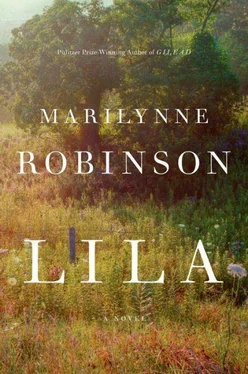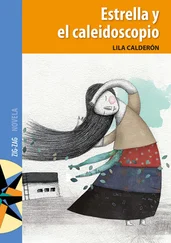The child was just there on the stoop in the dark, hugging herself against the cold, all cried out and nearly sleeping. She couldn’t holler anymore and they didn’t hear her anyway, or they might and that would make things worse. Somebody had shouted, Shut that thing up or I’ll do it! and then a woman grabbed her out from under the table by her arm and pushed her out onto the stoop and shut the door and the cats went under the house. They wouldn’t let her near them anymore because she picked them up by their tails sometimes. Her arms were all over scratches, and the scratches stung. She had crawled under the house to find the cats, but even when she did catch one in her hands it struggled harder the harder she held on to it and it bit her, so she let it go. Why you keep pounding at the screen door? Nobody gonna want you around if you act like that. And then the door closed again, and after a while night came. The people inside fought themselves quiet, and it was night for a long time. She was afraid to be under the house, and afraid to be up on the stoop, but if she stayed by the door it might open. There was a moon staring straight at her, and there were sounds in the woods, but she was nearly sleeping when Doll came up the path and found her there like that, miserable as could be, and took her up in her arms and wrapped her into her shawl, and said, “Well, we got no place to go. Where we gonna go?”
If there was anyone in the world the child hated worst, it was Doll. She’d go scrubbing at her face with a wet rag, or she’d be after her hair with a busted comb, trying to get the snarls out. Doll slept at the house most nights, and maybe she paid for it by sweeping up a little. She was the only one who did any sweeping, and she’d be cussing while she did it, Don’t do one damn bit of good, and someone would say, Then leave it be, dammit. There’d be people sleeping right on the floor, in some old mess of quilts and gunnysacks. You wouldn’t know from one day to the next.
When the child stayed under the table they would forget her most of the time. The table was shoved into a corner and they wouldn’t go to the trouble of reaching under to pull her out of there if she kept quiet enough. When Doll came in at night she would kneel down and spread that shawl over her, but then she left again so early in the morning that the child would feel the shawl slip off and she’d feel colder for the lost warmth of it, and stir, and cuss a little. But there would be hardtack, an apple, something, and a cup of water left there for her when she woke up. Once, there was a kind of toy. It was just a horse chestnut with a bit of cloth over it, tied with a string, and two knots at the sides and two at the bottom, like hands and feet. The child whispered to it and slept with it under her shirt.
Lila would never tell anyone about that time. She knew it would sound very sad, and it wasn’t, really. Doll had taken her up in her arms and wrapped her shawl around her. “You just hush now,” she said. “Don’t go waking folks up.” She settled the child on her hip and carried her into the dark house, stepping as carefully and quietly as she could, and found the bundle she kept in her corner, and then they went out into the chilly dark again, down the steps. The house was rank with sleep and the night was windy, full of tree sounds. The moon was gone and there was rain, so fine then it was only a tingle on the skin. The child was four or five, long-legged, and Doll couldn’t keep her covered up, but she chafed at her calves with her big, rough hand and brushed the damp from her cheek and her hair. She whispered, “Don’t know what I think I’m doing. Never figured on it. Well, maybe I did. I don’t know. I guess I probly did. This sure ain’t the night for it.” She hitched up her apron to cover the child’s legs and carried her out past the clearing. The door might have opened, and a woman might have called after them, Where you going with that child? and then, after a minute, closed the door again, as if she had done all decency required. “Well,” Doll whispered, “we’ll just have to see.”
The road wasn’t really much more than a path, but Doll had walked it so often in the dark that she stepped over the roots and around the potholes and never paused or stumbled. She could walk quickly when there was no light at all. And she was strong enough that even an awkward burden like a leggy child could rest in her arms almost asleep. Lila knew it couldn’t have been the way she remembered it, as if she were carried along in the wind, and there were arms around her to let her know she was safe, and there was a whisper at her ear to let her know that she shouldn’t be lonely. The whisper said, “I got to find a place to put you down. I got to find a dry place.” And then they sat on the ground, on pine needles, Doll with her back against a tree and the child curled into her lap, against her breast, hearing the beat of her heart, feeling it. Rain fell heavily. Big drops spattered them sometimes. Doll said, “I should have knowed it was coming on rain. And now you got the fever.” But the child just lay against her, hoping to stay where she was, hoping the rain wouldn’t end. Doll may have been the loneliest woman in the world, and she was the loneliest child, and there they were, the two of them together, keeping each other warm in the rain.
When the rain ended, Doll got to her feet, awkwardly with the child in her arms, and tucked the shawl around her as well as she could. She said, “I know a place.” The child’s head would drop back, and Doll would heft her up again, trying to keep her covered. “We’re almost there.”
It was another cabin with a stoop, and a dooryard beaten bare. An old black dog got up on his forelegs, then his hind legs, and barked, and an old woman opened the door. She said, “No work for you here, Doll. Nothing to spare.”
Doll sat down on the stoop. “Just thought I’d rest a little.”
“What you got there? Where’d you get that child?”
“Never mind.”
“Well, you better put her back.”
“Maybe. Don’t think I will, though.”
“Better feed her something, at least.”
Doll said nothing.
The old woman went into the house and brought out a scrap of corn bread. She said, “I was about to do the milking. You might as well go inside, get her in out of the cold.”
Doll stood with her by the stove, where there was just the little warmth of the banked embers. She whispered, “You hush. I got something for you here. You got to eat it.” But the child couldn’t rouse herself, couldn’t keep her head from lolling back. So Doll knelt with her on the floor to free her hands, and pinched off little pills of corn bread and put them in the child’s mouth, one after another. “You got to swallow.”
The old woman came back with a pail of milk. “Warm from the cow,” she said. “Best thing for a child.” That strong, grassy smell, raw milk in a tin cup. Doll gave it to her in sips, holding her head in the crook of her arm.
“Well, she got something in her, if she keeps it down. Now I’ll put some wood on the fire and we can clean her up some.”
When the room was warmer and the water in the kettle was warm, the old woman held her standing in a white basin on the floor by the stove and Doll washed her down with a rag and a bit of soap, scrubbing a little where the cats had scratched her, and on the chigger bites and mosquito bites where she had scratched herself, and where there were slivers in her knees, and where she had a habit of biting her hand. The water in the basin got so dirty they threw it out the door and started over. Her whole body shivered with the cold and the sting. “Nits,” the old woman said. “We got to cut her hair.” She fetched a razor and began shearing off the tangles as close to the child’s scalp as she dared—“I got a blade here. She better hold still.” Then they soaped and scrubbed her head, and water and suds ran into her eyes, and she struggled and yelled with all the strength she had and told them both they could rot in hell. The old woman said, “You’ll want to talk to her about that.”
Читать дальше












